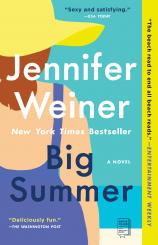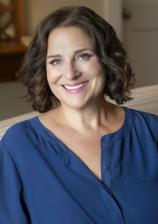Reading Group Guide
Discussion Questions
Big Summer

1. How did the novel’s prologue frame your reading experience? How did you imagine that these characters would later fit into the narrative? Were you surprised to discover Nick’s secret? What did you learn about his mother from this scene that informed your reading of the rest of the book?
2. Daphne and Drue have always had a complicated, manipulative relationship that has left Daphne feeling hurt and betrayed. In the end, what do you think was a bigger factor in Daphne attending Drue’s wedding? Was it her general curiosity, the photo opportunities, or her willingness to forgive? Do you think you would have made the same decision in her position?
3. One rule of appearance that Daphne outlines at the beginning of BIG SUMMER is to give the impression that “I care, but not too much” (p. 11). How is this related in particular to being a woman, especially a somehow marginalized one, on social media and even out in the world?
4. Aditya says of Drue, “‘I used to think, sometimes, that there were two Drues. Two people inside of one. There was the girl who was happy with me, volunteering and going to Red Sox games and sitting in the bleachers, or staying in and cooking.... Then there was the other Drue. The woman she was raised to be’” (p. 325). Is it possible that both of these personalities were real? Or do you think that one was more authentic than the other? And why was Aditya the character who experiences both versions?
5. Many characters in this novel are living with big secrets. For example: Nick has changed his name to escape his mother’s legacy, Leela Thakoon has also taken on a new identity, and Drue faked her entire wedding for the media attention. Is there a pattern to their motivations, or some secrets you find more justifiable than others?
6. One major theme in BIG SUMMER is nature vs. nurture. Does being born into a pedigreed family automatically guarantee a certain personality, or are we more affected by the behavior of those around us? How do Mr. Cavanaugh’s different extramarital children exemplify this? And how does this affect people’s ability to change?
7. BIG SUMMER explores various characters’ relationships to food. Daphne’s father teaches her to eat adventurously, Daphne’s grandmother views food as a tool to control her weight, and Drue, in a departure from her usual upscale choices, makes sure her wedding guests have chicken fingers and fries to come home to after a night of partying. What makes food so intimate, and what does it mean to Daphne to “ask your body what it wants” (p. 36)?
8. Social media has changed Daphne’s life. It’s not only her main source of income but where she’s found a community of women who make her feel seen. At the same time, she acknowledges, “‘Even if things don’t get better, you can always make them look good on the Internet’” (p. 60), which we see in action as Drue curates a pristine, if inaccurate, online presence. How has social media affected how all of us live our lives? Is there a way to be truly authentic online? (You might remember that Nick asks, “‘How are [kids] going to learn to have real relationships when most of their interactions are online?’” [p. 297])
9. One big theme of the book is forgiveness. Even Darshi, who was most skeptical of Daphne’s willingness to defend Drue, ultimately says, “‘No matter how bad Drue was, everyone deserves justice’” (p. 349). Do you agree? Are there other characters in the novel whose ultimate transformation supports your argument?
10. Daphne is a proud fat woman. Even so, like all people, she experiences moments of doubt that manifest in the taunting echoes of fat jokes she hears in her head (what she calls “my traitorous mind” [p. 135]). What does this say about how we internalize societal messages, even if we love ourselves? And how does this inform Daphne’s answer to the recurring question “How can I be brave?”
11. Midway through the novel, Daphne calls Drue “the luckiest girl I knew” (p. 155). However, in the scenes that follow, it dawns on Daphne that Drue might have thought the same of her as a child. In the end, what does it mean to Daphne to be “lucky”?
12. Jennifer Weiner chose two iconic settings for BIG SUMMER: Cape Cod and New York City. Both places are known for their glitz --- Cape Cod as the beachy getaway for many a Kennedy, and New York City as a cultural hub. What was the effect of choosing these locations, either on each character’s upbringings or the assumptions they make about one another, especially as relates to socioeconomic class?
Big Summer
- Publication Date: April 6, 2021
- Genres: Fiction, Women's Fiction
- Paperback: 384 pages
- Publisher: Washington Square Press
- ISBN-10: 1501133527
- ISBN-13: 9781501133527







